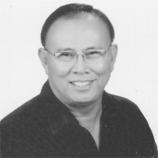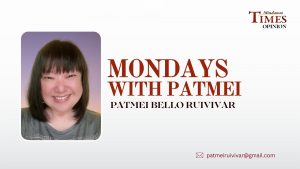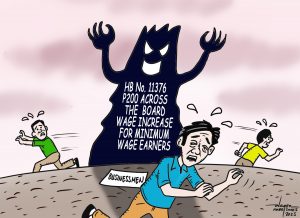Last Sunday, August 30, 2020, the Gospel was about Jesus’ passion for discipleship. In the Gospel Jesus began to show his disciples that he must go to Jerusalem and suffer greatly from the elders, the chief priests, and the scribes, and be killed.
Upon hearing Jesus’ manifestation Peter took him aside and began to rebuke Jesus by saying, “God forbid, Lord! No such thing shall ever happen to you.”
In another of Christ’s Gospel Jesus also told Peter that the head disciple will deny him (Jesus) three times. And Peter indeed denied about his association with Jesus during the Christ’s torture prior to his crucifixion.
The unfolding drama that has evolved in the House/Senate inquiries into the alleged multi-billion peso “heist” of people’s money under the care of the Philippine Health Insurance Corp. (PhilHealth), appears to have some similarities in episodes to that time in Jesus’ ministries.
Jesus, the Son of Man, was sent by the Father on a mission to proclaim the Good News of God’s Kingdom. In that way mankind will be liberated from the bondage of sin. But Jesus felt the work was so gargantuan a job that he had to engage the support of people who were willing to sacrifice with him; they who would not back out of the tests and trials and would remain faithful to their mission until the end.
Similarly, when the government set up PhilHealth, it was also to have its own mission – that of instituting a health care program for the people, especially those who have less in life. The government also engages the prospective beneficiaries themselves by first making them members and putting in an insignificant percentage of their income into the pooled funds of PhilHealth for future use when there is need for medical intervention on their health.
To carry out this mission the government also enlisted the help of people – like Jesus’s wooing his apostles — to run PhilHealth’s various services from the highest to the lowest echelon of the government’s health insurance agency. The selection of the men and women who were to make PhilHealth attain its mission was based on their supposed expertise, their integrity, and their willingness to do the needed sacrifices until the end. When these men and women were taken in they swore allegiance and faithfulness to their duties and responsibilities. They declared their allegiance to us – their master – and assured us of protecting the money we put in the agency so we could use it when our needs come.
In last Sunday’s Gospel Apostle Peter remonstrates his allegiance to Jesus by forsaking the name of God the Father saying he will do everything to protect Christ from harm when he goes to Jerusalem.
This pronouncement of Peter however, does not bode well with Jesus. Instead through the head apostle’s words Jesus sees in Peter Satan doing the talking. The devil is putting a stumbling block on the road to attaining His mission.
In the same vein, the PhilHealth corruption phenomenon is moving to a similar situation to that particular scene in Jesus and the Apostles’ journey. The leadership of PhilHealth at the national and regional levels had sworn allegiance to the government and to us. They show willingness to sacrifice and overcome tests and trials while doing their mission to help our health requirements.
Along the way however, the evils of corruption, the shin of money, have blinded them that they have become infidels in their jobs. And when their sinister activities became too glaring to ignore and the accountabilities are demanded, the leadership echelons in all levels suddenly turned like a hornets’ nest stirred.
The top level leadership of PhilHealth is throwing the books on the lower echelon – the Regional Vice Presidents. The passing on of the responsibility of the perpetuation of corruption to the regional PhilHealth leadership, at first glance, make a lot of sense. After all, it is from that level that requests for fund releases for reimbursements using the old scheme and the more corruption-prone CoViD 19 Interim Reimbursement Mechanism (IRM) emanate. The submissions from the regions are already deemed validated by the time these reach the national PhilHealth office. So, the top executives could not have made mistakes in heaping the blame on the regional bosses.
However, the regional PhilHealth chiefs, doing a Peter, profess their fidelity to their master, the people, by claiming that they cannot do anything to protect the “master’s” interest because they are merely following orders from their higher executives.
Claiming that some regional Vice Presidents are forming themselves into a “conscience block” they told congressional probers and the media that they even took the risk of losing their jobs and of being wrongfully accused of insubordination for complaining against illegal policies imposed on them by their top executives; all because they want to remain faithful to the PhilHealth’s mission to provide health insurance support to the people.
So, emboldened with their supposed clean conscience, the top regional PhilHealth executives jumped the gun on their bosses at the national level. The PhilHealth Mafia, they claim, is operating right there at the national office. The members are there and as they alleged, it is headed by no less than the Secretary of the Department of Health (DOH) who is chairman of the Board of Directors of PhilHealth.
Okay, let’s give it to them (the conscience block members). But data gathered and presented during the congressional inquiries show that the most number of hospitals and health service facilities given huge reimbursement funds from both the old system and the IRM are from the regions. Yes, there are requests that appear to have been delayed in processing and releasing but there are also requests from region-based hospitals and clinics that were processed and released as fast as lightning.
And we know of one rural-based hospital in Mindanao who got a whooping P11 million from PhilHealth for its IRM despite being wanting in capability for PhilHealth-authorized medical services. And worst, according to reports, the part of the money was used to finish a building and to pay for salaries and wages of hospital personnel.
Also, based on the probe report released by the Senate last Tuesday afternoon, many requests for reimbursements and fund releases from the regions including those under the responsibility of members of the “conscience block,” have glaring discrepancies not only in terms of preparation but in its supporting documents as well.
Of course it is a given that no Mafia-style operation can ever succeed without participation or support from all levels of any organization. Thus, at PhilHealth, we can safely assume that the operation of a Mafia-like group making money from every transaction done in the agency could have had its roots well-grounded for a long, long time already. And it is because there is tolerance in every illegal action made.
And why the tolerance? It is because for all those who have a say in the approval of transactions, they always adhere to the answer of the question, “What is in it for me, or for us?”
Now that all these shenanigans are brought to the open, each potentially responsible group is dodging responsibility and accountability to the point of pointing blame to whichever is vulnerable.
Woe to their masters – the people who foot the PhilHealth’s operating bill through their contribution and taxes they pay.





